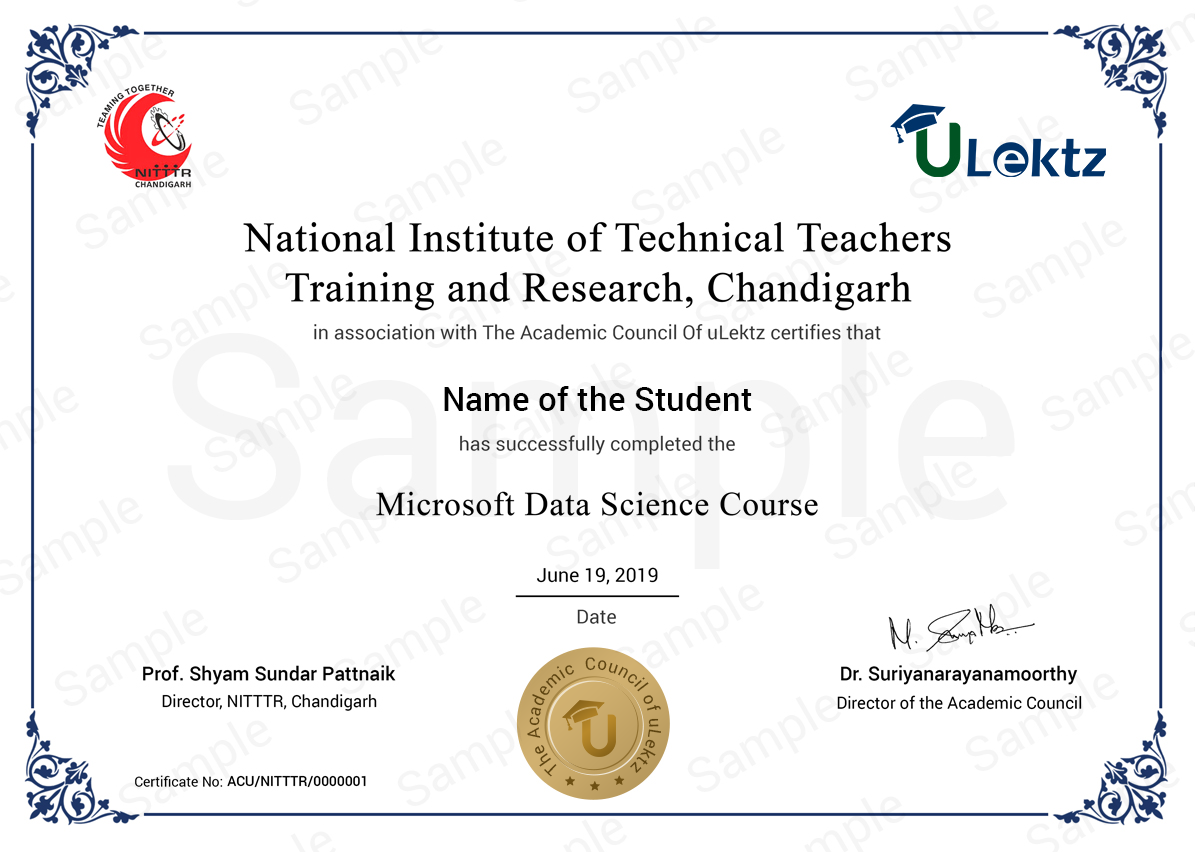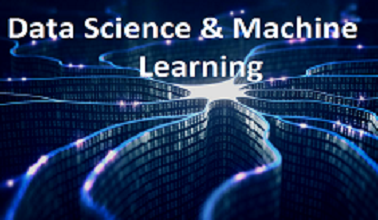

Note: Please check your Spam or Junk folder, in case you didn't receive the email with verification code.
Linear: Sequential Order
Course Description
Data Science is the study of the generalizable extraction of knowledge from data. This course serves as an introduction to the data science principles required to tackle data-rich problems in business and academia, including: Statistical Interference, Machine Learning, Machine Learning algorithms, Classification techniques, Decision Tree, Clustering, Recommender Engines, Text Mining & Time series.
Objective
The Data Science course enables you to gain knowledge of the entire life cycle of Data Science, analyze and visualize different data sets, different Machine Learning Algorithms like K-Means Clustering, Decision Trees, Random Forest, and Naive Bayes.
 1.1 Introduction to Data Science -Evolution of Data Science
1.1 Introduction to Data Science -Evolution of Data Science
 1.2 Business Intelligence vs Data Science - Life cycle of Data Science
1.2 Business Intelligence vs Data Science - Life cycle of Data Science
 1.3 Tools of Data Science
1.3 Tools of Data Science
 1.4 Introduction to Big Data and Hadoop
1.4 Introduction to Big Data and Hadoop
 1.5 Introduction to R
1.5 Introduction to R
 1.6 Introduction to Machine Learning
1.6 Introduction to Machine Learning
 Assessment
10 Questions
Assessment
10 Questions
 2.1 Statistical Inference - Terminologies of Statistics
2.1 Statistical Inference - Terminologies of Statistics
 2.2 Measures of Centers - Measures of Spread
2.2 Measures of Centers - Measures of Spread
 2.3 Probability -Normal Distribution
2.3 Probability -Normal Distribution
 2.4 Data Analysis Pipeline
2.4 Data Analysis Pipeline
 2.5 Data Extraction - Introduction -Types of Data Raw and Processed Data
2.5 Data Extraction - Introduction -Types of Data Raw and Processed Data
 2.6 Data Wrangling
2.6 Data Wrangling
 2.7 Exploratory Data Analysis - Visualization of Data
2.7 Exploratory Data Analysis - Visualization of Data
 Assessment
10 Questions
Assessment
10 Questions
 3.1 Introduction to Machine Learning
3.1 Introduction to Machine Learning
 3.2 Machine Learning Use-Cases -Machine Learning Process Flow
3.2 Machine Learning Use-Cases -Machine Learning Process Flow
 3.3 Machine Learning Categories
3.3 Machine Learning Categories
 Assessment
10 Questions
Assessment
10 Questions
 4.1 Three Basic Machine Learning Algorithms - Linear Regression
4.1 Three Basic Machine Learning Algorithms - Linear Regression
 4.2 k-Nearest Neighbors (k-NN)
4.2 k-Nearest Neighbors (k-NN)
 4.3 k-means
4.3 k-means
 4.4 Supervised Learning algorithm Logistic Regression
4.4 Supervised Learning algorithm Logistic Regression
 Assessment
8 Questions
Assessment
8 Questions
 5.1 Classification Techniques -Decision Tree - Introduction
5.1 Classification Techniques -Decision Tree - Introduction
 5.2 Algorithm for Decision Tree Induction
5.2 Algorithm for Decision Tree Induction
 5.3 Creating a Perfect Decision Tree
5.3 Creating a Perfect Decision Tree
 5.4 Confusion Matrix
5.4 Confusion Matrix
 5.5 Random Forest - Introduction
5.5 Random Forest - Introduction
 5.6 Navies Bayes
5.6 Navies Bayes
 5.7 Support Vector Machine Classification
5.7 Support Vector Machine Classification
 Assessment
10 Questions
Assessment
10 Questions
 6.1 Unsupervised Learning - Clustering & its use cases
6.1 Unsupervised Learning - Clustering & its use cases
 6.2 K-means Clustering
6.2 K-means Clustering
 6.3 C-means Clustering
6.3 C-means Clustering
 6.4 Canopy Clustering
6.4 Canopy Clustering
 6.5 Hierarchical Clustering
6.5 Hierarchical Clustering
 Assessment
10 Questions
Assessment
10 Questions
 7.1 Recommender Engines
7.1 Recommender Engines
 7.2 Types of Recommendations
7.2 Types of Recommendations
 7.3 User-Based Recommendation
7.3 User-Based Recommendation
 7.4 Item-Based Recommendation
7.4 Item-Based Recommendation
 7.5 Difference User-Based and Item-Based Recommendation -Recommendation use cases
7.5 Difference User-Based and Item-Based Recommendation -Recommendation use cases
 Assessment
10 Questions
Assessment
10 Questions
 8.1 Text Mining - Concepts of text-mining - Use cases
8.1 Text Mining - Concepts of text-mining - Use cases
 8.2 Text Mining Algorithms -Quantifying text - TF-IDF- Beyond TF-IDF
8.2 Text Mining Algorithms -Quantifying text - TF-IDF- Beyond TF-IDF
 Assessment
9 Questions
Assessment
9 Questions
 9.1 Time Series - Time Series data
9.1 Time Series - Time Series data
 9.2 Different components of Time Series data
9.2 Different components of Time Series data
 9.3 Visualize the data to identify Time Series Components
9.3 Visualize the data to identify Time Series Components
 9.4 Implement ARIMA model for forecasting
9.4 Implement ARIMA model for forecasting
 9.5 Exponential smoothing models
9.5 Exponential smoothing models
 Assessment
10 Questions
Assessment
10 Questions
 Final Assessment
20 Questions
Final Assessment
20 Questions
The certificate issued for the Course will have
Only the e-certificate will be made available. No Hard copies. The certificates issued by NITTTR Chandigarh, MHRD - Government of India and The Academic Council of uLektz. can be e-verifiable at www.ulektzskills.com/verify.



 60 hours Learning Content
60 hours Learning Content 100% online Courses
100% online Courses English Language
English Language Certifications
Certifications